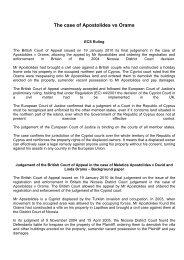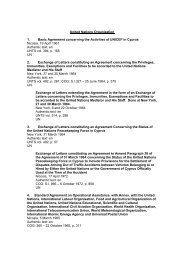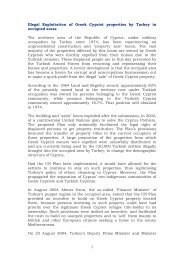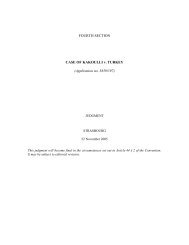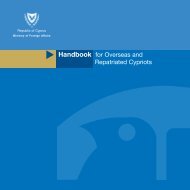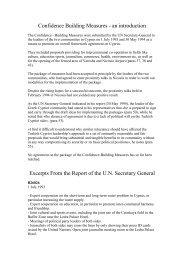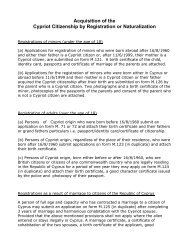Myra Xenides- Arestis v. Turkey
Myra Xenides- Arestis v. Turkey
Myra Xenides- Arestis v. Turkey
You also want an ePaper? Increase the reach of your titles
YUMPU automatically turns print PDFs into web optimized ePapers that Google loves.
XENIDES-ARESTIS v. TURKEY DECISION 21Greek-Cypriots. The respondent Government note in this context that thescope of the de facto regime in international law is wider than thatexpressed within the parameters of the Advisory Opinion of theInternational Court of Justice on Namibia (I.C.J. Reports, 1971, p. 16). Asfor the applicant's arguments regarding use of force and alleged breaches ofthe UN Security Council, the Government state that these are irrelevant inthe present context and are not issues to be decided by the Court. In anyevent they submit that the Security Council's resolutions have been subjectto criticism and thus, the observations of the applicant in this respect need tobe evaluated in this light.The respondent Government state that the new law cannot be consideredto be invalid merely because it is a legislative act of the “TRNC” nor doesits validity depend on any determination of invalidity of Article 159 of the“TRNC Constitution”. On the contrary, they maintain that it effectivelyaddresses the concerns that the Court expressed in its judgment in theLoizidou case about Article 159.Disputing the arguments of the applicant and the Cypriot Government,the respondent Government submit that both the Annan Plan and the newLaw are cogent evidence of the fundamentally different situation thatprevails today on the island of Cyprus. In this connection, they note that thesignificance of the plan lies, inter alia, in the acknowledgment of the realitythat the physical restitution of property is likely to be limited and is onlylikely to be available as part of a wider political settlement and not by wayof individual applications to the Court. The proliferation of applications likethe instant one to the Court actively undermines the possibility of reachingsuch a settlement whereas the availability of a remedy at a domestic levelaffords an opportunity to move beyond a piecemeal and partial approach toa resolution of the problems in Cyprus and would relieve the Conventionsystem of a burden (Broniowski v. Poland [GC], no. 31443/96,ECHR 2004-...).As regards the temporal aspect of the application and the question ofretrospective effect of Law no. 49/2003, the respondent Government arguethat the fact that a remedy is introduced after an application is received ordeclared admissible does not mean that it cannot be considered an effectiveremedy for purposes of admissibility. Particularly the question ofretroactivity assumes even less significance in the case of a breach which isregarded as “continuing”, since there must also be a correspondingobligation to address that breach during its continuation by recourse to anyeffective domestic remedy that becomes available. They consider that thereis nothing in the Convention that would prevent the Court to take intoconsideration the admissibility criteria at any stage of the proceedings.According to the Court's jurisprudence, there are exceptions to the generalrule that the exhaustion requirement must be assessed with reference to thetime at which the application was lodged (Baumann v. France,





